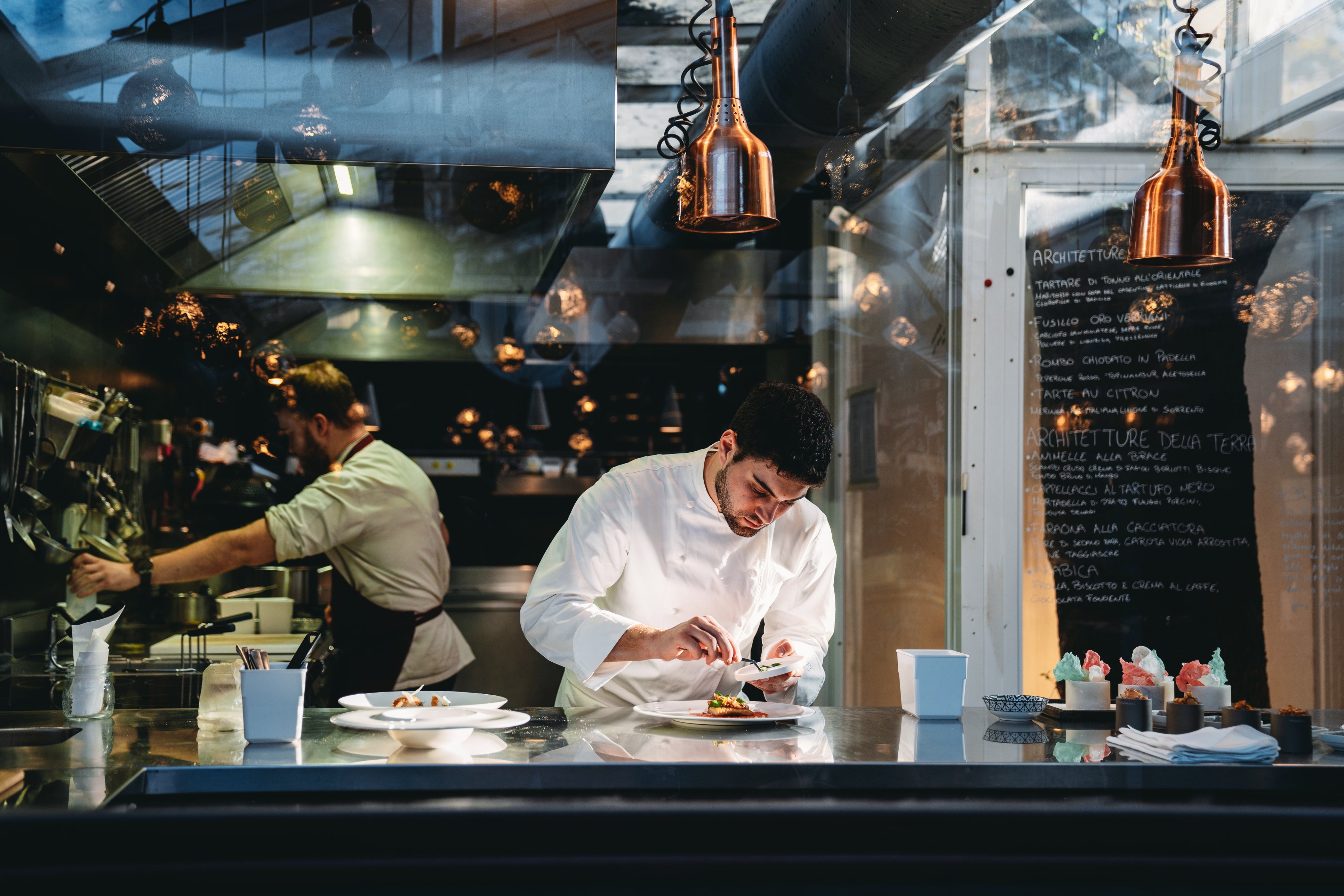The Independent's journalism is supported by our readers. When you purchase through links on our site, we may earn commission.
The award-winning US chef with a delicious theory of change
Can restaurants really solve the climate crisis? The world’s top chefs are joining together to make gastronomy part of the solution...


Your support helps us to tell the story
From reproductive rights to climate change to Big Tech, The Independent is on the ground when the story is developing. Whether it's investigating the financials of Elon Musk's pro-Trump PAC or producing our latest documentary, 'The A Word', which shines a light on the American women fighting for reproductive rights, we know how important it is to parse out the facts from the messaging.
At such a critical moment in US history, we need reporters on the ground. Your donation allows us to keep sending journalists to speak to both sides of the story.
The Independent is trusted by Americans across the entire political spectrum. And unlike many other quality news outlets, we choose not to lock Americans out of our reporting and analysis with paywalls. We believe quality journalism should be available to everyone, paid for by those who can afford it.
Your support makes all the difference.When it comes to beef, US chef Anthony Myint doesn’t buy into the often touted “eat less, eat better” philosophy. He believes we shouldn’t worry about how much beef we consume, as long as it’s climate beneficial beef we’re eating.
“It’s a much more optimistic and delicious theory of change,” he says.
Very crudely speaking, the theory is based on the cultivation of healthy soil. The secret to this model is to replace monocultures and chemical fertilisers with bovines grazing on pasture and naturally fertilising the ground – as they have done for millennia.
The ultimate goal is to restore carbon – often called the building block of life – to the soil where it is useful in growing more nutrient-dense foods, thereby removing it from the atmosphere.
The science to back this theory up is still relatively new, but it is stacking up, notably with the recent RSA Food, Farming and Countryside Commission report concluding that farmers need to shift from intensive farming to more organic and wildlife friendly production, including raising livestock on grass.
Of course the eat more, eat better theory only works if we’re consuming 100 per cent grass-fed beef that has been genuinely farmed in tune with nature. In the US, where more than 650 million acres of land is used for pasture, there’s a lot more room for steak than in the UK.
And the argument isn’t as compelling for all meat. Myint acknowledges that from a carbon point of view, intensively farmed chicken is as “diabolically productive” as it is inhumane. We definitely should be eating less of this at least until efforts to create climate beneficial pastured chicken production are more widespread.
There’s also a less clear link with pigs so far, which aren’t part of the grassland food cycle – although they do eat food waste and can provide value for arable farming systems.
Myinted
Now, Myint’s Californian theory of change is on its way to becoming a global one.
He’s the founder of Mission Chinese Food which has just been awarded the Basque Culinary World Prize, and €100,000 (£91,000) prize money, for the Perennial Farming Initiative (PFI) project he launched with his wife, journalist Karen Leibowitz, two years ago.
“I'm tremendously honoured to receive the award. It's the greatest honour of my career,” says Myint, who will be investing the money into his non-profit.
From a consumer point of view, the project means we can now choose to dine from a list of restaurants that are committed to being carbon neutral.
PFI's Executive Director Leibowitz says: “We’re connecting chefs, farmers, consumers, scientists and policy-makers to create a renewable food system rooted in healthy soil.”
Essentially, restaurants’ carbon impact is assessed by the PFI's Zero Foodprint programme, created in collaboration with carbon experts. The restaurants then makes changes to improve their carbon footprint where possible and offset their remaining carbon emissions by either funding renewable farming and renewable energy projects or adding a carbon charge to customers’ bills, which in most cases this works out to be a miniscule one per cent.
This “tax” is used to pay farmers $15 per ton of carbon removed from the atmosphere, by employing farming practices that pull carbon dioxide from the air, prevent its release from the soil or store it in the ground. These include traditional farming methods such as cover-cropping, low-till farming and using livestock to graze.
“In the US we, unfortunately, subsidise bad and extractive farming, so the idea of subsidising good farming should be very welcome, and the idea that, at scale, it would solve global warming should also be very optimistic,” says Myint.
If you’re launching any project, it helps to have capital and industry leaders behind you.
Myint was chosen to win by an impressive jury of 14 of the world’s leading chefs, including Joan Roca, of twice ranked world number one restaurant Celler de Can Roca in Spain; Massimo Bottura, the three-Michelin-star restaurant Osteria Francescana in Italy; and Dominique Crenn, the first and only female chef to achieve three Michelin stars in the United States for Atelier Crenn in San Francisco.
So impressed were they, that all of the judges have pledged to sign up to his initiative.
“Instead of contributing to the problem of climate change, gastronomy can be part of the solution,” says Roca, chair of the prize jury.
“More than raising awareness, Myint calls for action by providing concrete tools for our industry to reduce its impact on the environment”.
But, for Myint, the world’s best chefs are just the beginning.
“What’s exciting about our project is that it’s not just for the Michelin-starred chef. It also has scope for McDonalds to implement better grazing practices by shifting the focus to improving land management – 1000 hectares at time.”
Mastering grassroots change
What Myint calls “renewable farming” is a growing global trend among top chefs and the farmers from who they source their prized produce.
In the UK it’s more commonly known as regenerative agriculture and encompasses the best of organic, biodynamic and Pasture for Life farming.
McMaster's top pick of UK restaurants that fully engage in the food system
Where the light gets in – Stockpor www.wtlgi.co
St John – Farringdon www.stjohnrestaurant.com Cub – Hoxton www.lyancub.com
Doug McMaster, founder of Brighton’s multi award-winning zero-waste restaurant, Silo, was also in the running for the award this year.
“Once upon a time an artist challenged me not to have a bin and during that endeavour there was an extensional moment where I realised industrialisation is the reason waste exists,” he says.
“Bins are a human thing; penguins don’t have bins.”
He has just released his first book Silo: The Zero Waste Blueprint and is moving his restaurant from Brighton to east London’s Hackney Wick, opening this September.
The menu is 75 per cent plant-based and super local; each dish will represent nature’s cycle. It will feature the likes of smoked violet carrots with egg yolks and elephant garlic and Jerusalem artichokes cooked on fire with stilton sauce and pickles, accompanied by a natural and biodynamic wine list.
McMaster says: “I don’t have the patience for governmental change, I’m a bottom up kinda guy.
“When I opened Silo everyone said it wasn’t going to work because the idea was too extreme. I re-mortgaged my mum’s house for £30,000 to open it in 2014 and now the world is listening and zero-waste is a big deal.”
The economies of change
Like McMaster, Myint also sees zero-waste as part of a bigger issue.
He says it feels weird to refer to his journey to chefdom as beginning with his degree in Economics and Asian studies; for Myint economics is simply “putting numbers on common sense”.
But, interviewing him, it is clear his training in economics has helped him to make the leap “from sustainability being about sourcing well and tackling food waste to the biggest opportunity – creating a food system that incentivises healthy soil”.
It’s a connection that is just taking root for most people, which is perhaps one of the reasons Myint had to close his sustainability-focused restaurant The Perennial near Silicon Valley, in February this year after three years of trading. Perhaps, if they opened today it would be a different story.
But The PFI’s network of carbon neutral restaurants grew alongside that endeavour and the experience helped Myint to shift from trying to create a movement that’s consumer-led to industry-led.
“If you think that after all these years organic only represents about two per cent of farmland in the US – demand driven change works too slow. It doesn’t change anything on a time scale that’s useful for climate change, despite it being helpful for individual farmers and their consumers,” Myint explains.
“Even if you can get someone to pay $3 more for organic, by the time that trickles down and gets to the farmer it’s only a few cents.
“So, instead, we’re paying farmers to reverse climate change.”
Jock Zonfrillo, Orana Winner of the Basque Culinary World Prize 2018
Last year the prize went to Jock Zonfrillo for dedicating 18 years to discovering and defending the ancient food culture of Australia’s indigenous peoples, which have been largely excluded from the national culinary identity
At the request of the elders, he used part of the money for a packing shed in Kimberley, which serves as a facility to process indigenous ingredients and doubles up as a community hub
Zonfrillo says: “Winning the award gives acknowledgement for indigenous culture and its people. It puts the importance on the preservation of culture. It means a lot more than money.
The chef sat on the panel of judges this year and has committed to try to bring the PFI project to Australia. His restaurant, Orana, is popping up in Sydney from 16 Auguust- 15 September 2019. (restaurantorana.com)
The Basque Culinary World Prize, is an annual global award co-founded by the Basque Government and Basque Culinary Center; Lizzie Rivera is the founder of ethical lifestyle site BICBIM (bicbim.co.uk)
Join our commenting forum
Join thought-provoking conversations, follow other Independent readers and see their replies
Comments